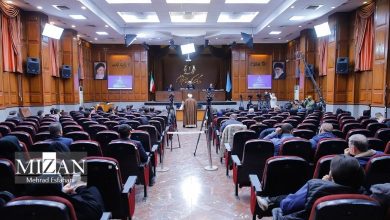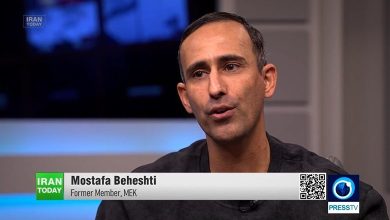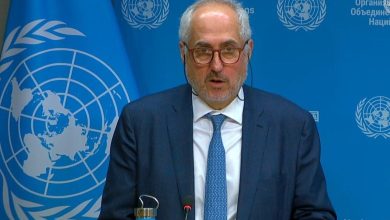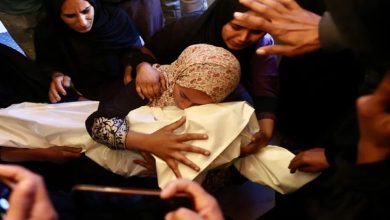Association for Defending Victims of Terrorism (ADVT) – “Seventy-Five Years with the United Nations” webinar was held, on the occasion of the 75th anniversary of the establishment of this organization on 24 November by Association for Defending Victims of Terrorism in cooperation with Faculty of Law and Political Science of Allameh Tabataba’i University, the United Nations Information Center in Tehran, the Hague Center for International Law and Investment and Word for Peace attended by university professors and the families of terrorism martyrs to review and elaborate the current situation and future prospects of the United Nations.
Our founding mission is more critical than ever; to promote human dignity, protect human rights, respect international law, and save humanity from war
At the beginning of the meeting, the message of UN Secretary General Antonio Guterres was displayed on the occasion of the 75th anniversary of the United Nations. Antonio Guterres emphasized in his video message, “The 75th anniversary of the United Nations falls in the middle of a global pandemic. Our founding mission is more critical than ever, to promote human dignity, protect human rights, respect international law, and save humanity from war. The clock is ticking. We must also make peace with our planet. Around the world, we must do more to end human suffering from poverty, inequality, hunger and hatred — and fight discrimination on the basis of race, religion, gender or any other distinction.”
Victims of terrorism must seek to demand explanations on double standards
Dr. Elham Aminzadeh, Professor of Law at the University of Tehran, as the first speaker of the meeting said “the philosophy of existence of the United Nations, which is hidden in the Charter of the UN, is to protect human generations from the scourge of wars which is a sign of the negative meaning of peace; namely absence of war. However, the absence of war does not mean the well-being of all human beings, and we need to think about justice as well. “Some say peace is the root of justice, while others see justice as the cause of peace”.
In another part of her speech, Dr. Aminzadeh said: “During these seventy-five years, no serious investment has been made on the goals of the United Nations. At different times, there are resolutions that are a star in the sky of the United Nations.” “These resolutions have been able to condemn acts of terrorism, but they have failed to eradicate the roots of terrorism. If poverty is eradicated, terrorism will end as well. But unfortunately, the United Nations has not been able to succeed in this issue, and the reason is the lack of a universal definition of terrorism and liberation movements.”
“In the case of the invasion of countries, we have no practical speed like the invasion of Iraq against Kuwait, while in the similar case of Iraq aggression on Iran, we witnessed silence during 8 years.,” said the former legal advisor to president in another part of her speech on UN discrimination in various cases. She added: “Or in the case of the assassination of Rafic Hariri, a court was established immediately by the Security Council. While in the cases of assassination of many heads of states, we have never seen such a court similar to Lebanon.”
She continued, “The courts of Yugoslavia and Rwanda are other cases in the world and the case of the Rohingya in Myanmar is similar to them. But we do not see a court like Yugoslavia or Rwanda”. “It seems that the United Nations has not addressed peace and justice in the same way. In the preamble of the UN Charter the philosophy of the United Nations is to save nations from the scourge of war, and if it had been done well, many of these things would not have happened in seventy-five years.”
Dr. Aminzadeh stated that “Every day, nations expect more from the United Nations. And given the multipolarity of the world, we can say that global governance alone cannot be achieved by resolution.”
“Victims of terrorism must seek to demand explanations on double standards, and such webinars are valuable,” she concluded.
It may be necessary for the United Nations to begin their next seventy-fifth year with a renaissance
In another part of the meeting, Dr. Zamani, Professor of International Law at Allameh Tabataba’i University, appreciated the Association for Defending Victims of Terrorism and stated that, “After seventy-five years since the founding of the United Nations have had many ups and downs, including the possibility of a nuclear war in the early 1960s, collapse of the Soviet Union, unipolarity of the world in the early 1990s, terrorist attacks of 9/11 in 2001, and the peak of the US unilateralism in the last four years, especially in the Coronavirus crisis. It may be necessary for the United Nations to begin their next seventy-fifth year with a renaissance”.
“The justice discussed in the preamble to the UN Charter 75 years ago was not abstract and was based on international law, on women’s equality, respect for human rights and freedoms, and the struggle for self-determination, and decreasing a huge class gap between nations and countries,” said Allameh Tabataba’i University professor. He continued: “It seems that the justice that the United Nations wants in the light of bodies such as the Economic and Social Council, the Board of Trustees, the Secretariat and even the General Assembly is not social justice and is judicial justice.”
Dr. Zamani continued, “Good measures have been taken in the issue of judicial justice for the victims of terrorism. On the other hand, the Human Rights Commission and human rights bodies and the ten committees that have the right to seek compensation, such as the Committee for the Prevention of Torture, etc., have tried to guarantee the victims of terrorism the right to compensation.”
“In addition to these human rights bodies, the Economic and Social Council, and especially the United Nations Office on Drugs and Crime, have made great efforts to ensure that victims of terrorism have access to criminal justice.”
Confirming Dr. Elham Aminzadeh’s remarks, Dr. Zamani asked, “Shouldn’t other victims of terrorism be supported by the United Nations? What is the difference between them, and especially the victims in the Islamic Republic of Iran, who are about 18,000 victims? What is the difference? This discriminatory view reflects the fusion of rights with politics.” “The United Nations seems to need to reform its approach to protecting victims of terrorism,” he said.
“.
Collective wisdom makes society cohesive
Dr. Zaheri, Professor of Law at the Islamic Azad University, who was the next speaker at the meeting, said, “The concept I want to examine in this meeting is collective wisdom, which can be equated with COMMON SENSE or WISDOM OF CROWD in case we consider it as an epistemological tool. In this case, there are several examples in this field.” He continued, “Our discussion is the use of this collective wisdom in the structure of the United Nations and the study of its process in the United Nations.”
The university professor said, “In the structure of the United Nations and at the time of its design in 1945, there was a debate whether the individual should be considered or collective wisdom. The Charter of the United Nations seems to be concerned with both. That is, there is evidence to pay attention to the individual like the principle of sovereignty of states, which has been considered in various cases, as well as the collective wisdom that has been considered in various issues, including the right of the people to self-determination and method of council management in the United Nations, UN commissions and the basis of the ECOSOC structure in the use of NGOs is an emphasis on collective wisdom.”
He added, “The foundation chosen in the establishment of the United Nations did not work well during the Cold War, and these conditions did not allow this collective wisdom to function well in the United Nations. However, after the Cold War, the concepts of world sovereignty and good governance are emerging. In this era, we have the issue of world sovereignty, and the standards of world sovereignty, which are not unrelated to collective wisdom and have some assumptions.”
“One of its many assumptions regarding collective wisdom is that it has considered stakeholder groups,” Dr. Zaheri added.
He said, “There are three important assumptions in this regard. The first assumption of world sovereignty is that the collective wisdom of a society is cohesive. That is, instead of competition between nations, there is a central correlation that leads to the growth and development of all. But at least until now, this assumption has not been realized, but the opposite has been proven.” He continued, “The second assumption for world sovereignty is that we remove internal borders and divisions and face the concept of global citizenship. That is, an international civil society is created, which has not been realized yet and there are no signs and of approaching this goal. The third assumption of governance is development and developmentalism, that is, global collective wisdom leads to development, but unfortunately this assumption has not been realized either, and there is no sign of it.”
At the end of his intervention, Dr. Zaheri said, “In the structural design of the United Nations, the Charter of the United Nations, at first, had no reliance on collective wisdom or on the individual. The trends until the Cold War practically destroyed collective wisdom. But after the Cold War, it developed in theory, and after the Cold War and the implementation of world sovereignty, it is still a long way from its standards and assumptions.”
UN has remained in the 1945 order
Curtis Doebbler, an international lawyer, at the beginning of his speech said, “The United Nations is the only inclusive organization that any country can join, but there have been some deficiencies in the United Nations over the past 75 years.”
“The first and most important deficiency is that it is based on the world order of 1945. World peace and security were among the goals of the United Nations and the first step was through the Security Council. But there is no representative of Africa in it. So the most important reason for the UN’s backwardness is that it has remained in the 1945 order.”
The American lawyer said, “The second reason for the deficiencies in the United Nations is that development is mentioned in the UN Charter, but it does not mean the development of a limited number of countries, but the creation of equality in the world. While Africans are less developed and there is a gap, aids for development has been given more to countries like Italy.”
“The third and final issue is that the United Nations is like a government that violates its constitution. In one case, the United Nations sought to appoint director for UNICEF, but despite several suitable candidates, the person who the US suggested was appointed.”
The United Nations needs a larger, global mechanism that can help all of us fight the scourge of terrorism
Mr. Ghulam Rasool Dehlvi, Director of the Word for Peace, was the next speaker at the meeting. He thanked ADVT for organizing the meeting and said, “The United Nations needs a larger, global mechanism that can help all of us fight the scourge of terrorism.”
The human rights activist said, “Terrorism has affected freedom and human rights in the Kashmir Valley since 1989. Terrorist acts have also affected people’s livelihoods, such as agriculture, tourism, and handicraft industry. On the 75th anniversary of the United Nations, this body must address this situation. Not only they must play their role in protecting human rights, but they must also pay attention to all the victims of terrorism.”
“It is very important to distinct between the reality and fiction, as well as truth and falsehood. It is more important for the United Nations to protect the right to the truth. Sometimes UN bodies report on the basis of false information,” he said. “They ignore the real information, and as a result, the UN counter-terrorism agenda is affected in the same way.”
Politicization reduces the credibility of the United Nations
Dr. Nejandi Manesh, Professor of International Law at Allameh Tabataba’i University, was the last speaker at the meeting. He stated, “Given terrorism and double standards, I would like to say that gaining public trust and policies of a body, if it has a negative impact on public trust, the performance of that body will be weakened. The United Nations must also have the trust of their Member States and the trust of the nations”. “We are the people of the United Nations in the form of the international community and the global civil society. The mechanisms for monitoring the actions of the United Nations have been strengthened, though informally.” He continued, “Dr. Zaheri’s discussion about collective wisdom can be considered assessment of public opinion.”
“We do not have good or evil terrorism and it is a misinterpretation. Terrorism is condemned against everyone and with the participation of any person, and it must be considered the common enemy of humanity. The international community must play their role,” said Allameh Tabatabai University professor. “If we look at the reaction of countries to the United Nations, some countries that are fighting terrorism see the United Nations performance as discriminatory. One of the pillars of the United Nations is the Security Council. It is true that this is a political pillar, but it should not be politicized. Politicization reduces the credibility of the United Nations.”
Dr. Najandi Manesh added, “The reality is that we cannot stop terrorism as long as the organizations have a kind of double standard. The Human Rights Council has also formed several fact-finding committees for Myanmar, etc., but has a committee been formed for the U.S. military action in Afghanistan, etc.? Is there a fact-finding committee for secret C.I.A site in Thailand? Reports on Syria are government-focused, but many human rights abuses have been committed by non-state actors. War crimes committed in Yemen and European accountability show a selective approach,” he concluded.





